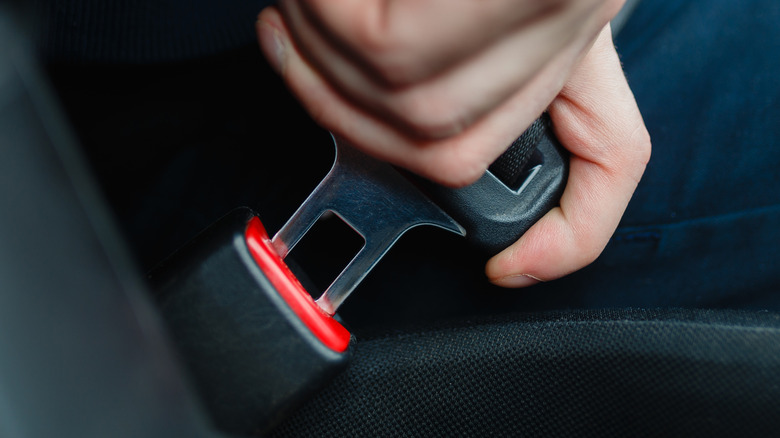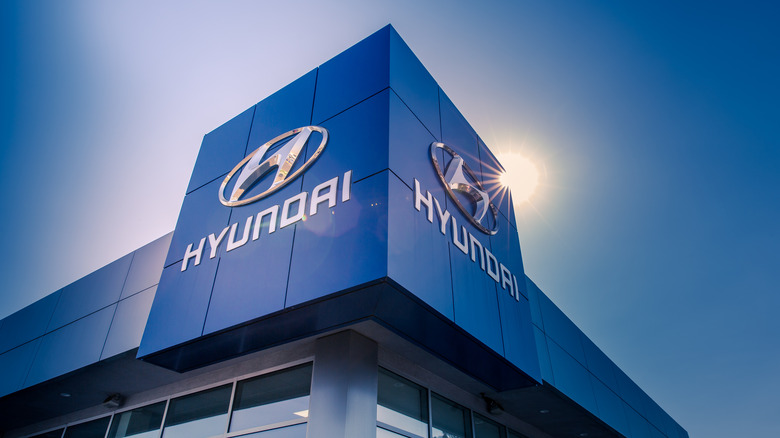Exploding Seatbelts Force Hyundai To Issue A Recall
When it comes to vehicle recalls, some are more dramatic than others. Most manufacturer recalls are due to small issues like a loose bolt that makes an annoying rattling noise or an excessively shiny dashboard, but others are caused by big bigger problems: it's hard to forget that time when Jeep Cherokee engines were randomly catching on fire. The most important recalls are the ones related to problems that pose safety risks to drivers and their passengers, which is why it's important to pay attention to the latest recall from Hyundai.
The National Highway Traffic Safety Administration (NHTSA) has published an advisory from Hyundai Motor America that reveals thousands of 2021 – 2023 Hyundai Elantra, 2021 – 2022 Elantra Hybrid Electric (HEV), and 2019 – 2022 Accent cars have been recalled in the U.S. over the risk of exploding seat belts. That's not an exaggeration, mind — the seat belt assemblies can literally explode, turning nearby metal into small pieces of shrapnel that may cause injuries during a wreck. A total of 239,000 vehicles are covered by the recall.
Hyundai's exploding seat belt issue explained
The idea of an exploding seat belt may sound absurd, but it's a very real possibility due to the type of safety hardware found in many modern vehicles. In the case of this recall, the affected Hyundai cars are equipped with a seal belt element called a pyrotechnic pretensioner. This safety device isn't visible to drivers or passengers because it is typically housed near the belt retractor or belt lock elements located on either side of a car seat. Most vehicles have at least one pretensioner for each seat.
The pyrotechnic pretensioner is designed to help protect drivers and passengers by rapidly tightening a seat belt immediately following the initial impact during an accident. The safety device achieves this by triggering a charge element that expels a type of gas nearly instantly; the gas triggers a small turbine, according to CARSP, completing a process that forces the seat belt to tighten against the person in the seat. This helps ensure the person remains snug in their seat during the crash, potentially saving their life. In the case of this Hyundai recall, however, the pyrotechnic pretensioner may malfunction and launch small pieces of metal inside the car.
The automaker explains in its recall notice that it doesn't yet know why the affected pretensioners are causing this problem, but an investigation into the problem is underway, and vehicle owners will get more information about the "root cause" once it is identified. Fortunately, this problem is limited to faulty pretensioners that deploy during a crash, meaning drivers don't need to worry about random seat belt explosions while cruising down their local highways.
What Hyundai plans to do about the problem
According to the recall notice the automaker submitted to the NHTSA on May 19, Hyundai will notify impacted vehicle owners by mail about the problem and advise them of the next steps that'll be necessary to fix it. As with other vehicle recalls, affected Elantra and Accent owners will be told to take their vehicles to a Hyundai dealership to get the pretensioners serviced for free. In most cases, the driver will need to contact the dealer from which they purchased the car to schedule a servicing appointment; this will only be possible once the recall notices have been sent out.
The fix will involve securing a "cap" over certain components in the pretensioner; doing this will, the automaker says in its recall notice, "prevent potential abnormal deployment" in the event of a wreck. If you own one of these recalled vehicles and have already paid a mechanic to fix issues related to the malfunctioning pretensioners, Hyundai says it'll reimburse you the costs.
Going forward, Hyundai says it'll prevent this issue from occurring in future vehicles by adding a vent valve to the pipe connected to the gas generator element in the pretensioner. This design change was implemented in Hyundai cars starting on May 16, 2022, according to the recall notice. The automaker plans to send the recall notifications to vehicle owners on July 15, 2022, the same date it'll officially send notifications to dealerships, as well. Once you've received the letter, follow the directions contained within it to get your vehicle serviced.
Though the issue sounds frightening, it's certainly not the worst recall in automotive history, and modern vehicles continue to implement key safety features that help keep everyone — including nearby pedestrians — safe from accidental collisions and weather-related driving mistakes.


